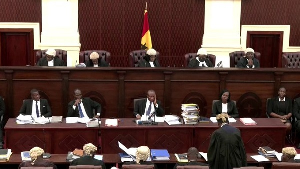Entrepreneurs are advocating the imposition of additional taxes on imported goods to serve as a revenue stream to support start-up businesses, and to also make nascent businesses competitive on pricing.
President of the Entrepreneurs Foundation of Ghana Ato Gaisie cited rice and textiles as some of the goods that could be levied to generate seed-money for a well-targetted entrepreneurship fund as the present funding support from government is scanty and misguided.
“In battling the influx of imported goods, a special levy must be imposed on those like rice and textiles in order to allow local business have a competitive edge over cheap imports.
“Revenue from the special levy on imports should then be used to establish a Fund to assist local entrepreneurs,” he said.
Mr. Gaisie said this on Tuesday at a breakfast meeting organised by Graphic Business with support from Fidelity Bank on the theme “Supporting Ghanaian/ Local Entrepreneurs”. The event was also used to re-launch Graphic Business, a subsidiary of Graphic Communications Group.
He noted that support offered by government to indigenous entrepreneurs barely scratches the surface of a bigger need that rather has to be met with huge resources as well as other institutional support.
Successive governments have over the years introduced various schemes such as the Microfinance and Small Loans Centre (MASLOC), Ghana Youth Employment and Entrepreneurial Development Agency (GYEEDA), and recently Youth Enterprise Support (YES) with a seed capital of GH?10m to boost the capacities of local businesses.
But Mr. Gaisie said government’s piece-meal approach in offering support to local businesses will not yield the desired results.
“Government expects to throw a few cedis and then be making results; even setting aside US$500million is not enough to yield results. Throwing money into the mix as and when is not enough to solve the challenges businesses face,” he said.
Local business owners, he said, have to contend with challenges such as power outages, lack of access to credit, increased competition from imported goods among others. According to him, addressing these challenges requires a concerted and deliberate effort.
Also addressing the event attended by bankers, policymakers and other business leaders, Rashid Pelpuo, Minister of State in charge of Private Sector Development and Partnerships, stated that government is considering the establishment of an entrepreneurial school to fine-tune the skillset of indigenous business owners.
He said the potential of local business owners is enormous, and that without harnessing their talent businesses will remain in their present sorry state.
Click to view details



Business News of Wednesday, 18 March 2015
Source: B&FT
Entrepreneurs call for import levies to support start-ups

















